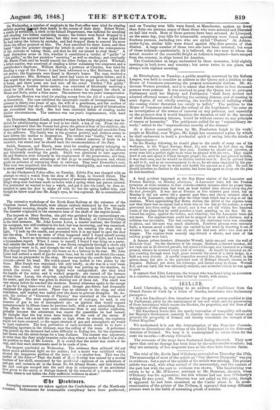Tbt Vrobinces.
Sweeping measures are taken against the Confederates of the Northern Onnties. Indictments for treasonable conspiracy have been preferred;
and on Tuesday true bills were found, at Manchester, against no fewer than forty-six persons, many of them those who were arrested and liberated on bail last week. Most of these persons have been arrested. At Liverpool, on the same day, true bills for treasonable conspiracy were found against fourteen persons, including two who are styled "Doctors." At Ashton- under-Lyne, similar bills were found against fifty-four persons of that district. A large number of these two sets have been arrested; but some of those indicted—particularly, it is believed, the two men to whom the actual murder of the constable Bright at Ashton is imputed—have escaped from the country, in ships bound for America.
The Confederates at large, undaunted by these measures, hold nightly meetings in both town and country; but never twice in one place, and always with vigilant scouting.
At Birmingham, on Tuesday, a public meeting, convened by the Reform League, was held to consider an address to the Queen and a petition to the House of Commons concerning the present commercial distress. Mr. Al- derman Weston presided, and it is stated that from three to four thousand persons were present. It was resolved to pray the Queen not to prorogue Parliament until her Majesty and Parliament "shall have devised and adopted effectual means of relieving the existing distress, and of meeting irt some degree, if not wholly averting, the terrible state of suffering whioh the coming winter threatens too surely to inflict." The petition to the House of Commons stated that the refusal of the Legislature "to enter on an investigation of the means of removal on any pretence, and especially on the pretence that it would lengthen the duration or add to the amount of their Parliamentary labours, would be without excuse on any principle of reason or humanity." The petitioners called for an "extraordinary a., medy," suited to the "unprecedented severity of the disease."
At a dinner annually given by Mr. Pemberton Leigh to his workZ people at Hindler, near Wigan, Mr. Leigh has announced a plan by which he shall endeavour to instil a prudential spirit of saving into the minds of his dependents— On the Monday following, he should place to the credit of every one of his workmen, in the Wigan Savings Bank, 21.; and when he had done so, they would have perfect control over that bum. Further he should not interfere, as every man had a perfect right to do what he pleased with his own. They might draw it out and spend it if they thought proper; for, after he had given it to them, it was their own, and he wished no ffirther control over it. But he advised them to add to it; and as an encouragement to do so, for all sums depa,ited by the peo- ple during the first year he would add double the amount as a gift. Ile said he should interfere no farther in the matter, but leave his agent to carry out the plan he had described.
A fatal accident happened at the Bay Horse station of the Lancaster and Preston Railway, on Monday afternoon. A Lancaster train left the Prestog terminus at three minutes to four o'clock—twelve minutes after its proper time. The London express-train had been an hour behind time almost every day for the last fortnight. It was due at Preston at five minutes past three, but on Monday it did not arrive till a quarter past four; and eleven minutes after it went on for Lancaster, rushing after the other train which had to stop at all the stations. When approaching Hay Horse station, the driver of the express-train saw that there was no signal that a train was on the line at the station; a curve prevented him from seeing far ahead; and it was not till within five hundred yards of the place that he could perceive a train standing on the line. He re- versed his engine, applied the breaks, and whistled; but the Lancaster train did not move. The express-train could not be stopped in so short a distance, and a collision was inevitable. The hest carriage in the stationary train was smashed to pieces, and the next was mach shattered. Fourteen persons were seriously hurt; a woman saved a child that she carried in her arms by throwing it out of window; her own legs were cut off, and she died soon after: two men are in danger. The express-train scarcely experienced a shock; and none of WI railway people were hurt.
A famous prison-breaker, Alexander Worrell, lately escaped over the wall of Kirkdale Goal. On the discovery of his escape, Holland, a shrewd turnkey, did not rush oat in ill-directed pursuit, but seized a telescope, and hastened to a rising ground, whence he scanned every nook of country. At length he detected an ob- ject crawling through some high grass towards the cover of a thick hedge, in a field not very distant. A careful inspection assured him this was Worrell, in his prison-dress, but also in the purloined coat of Holland himself, thrown on for disguise. Holland put down his telescope, and darted away in chase. Worrell fled, and ran hard, but was ultimately secured; and at twelve o'clock he was again in gaol.
It appears that Ellen Lawrence, the woman who was found lying on a common in a senseless state, had really been killed by Smith, with stones.


























 Previous page
Previous page